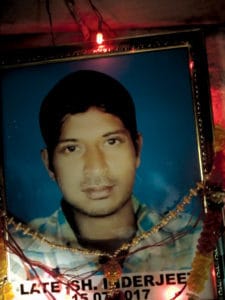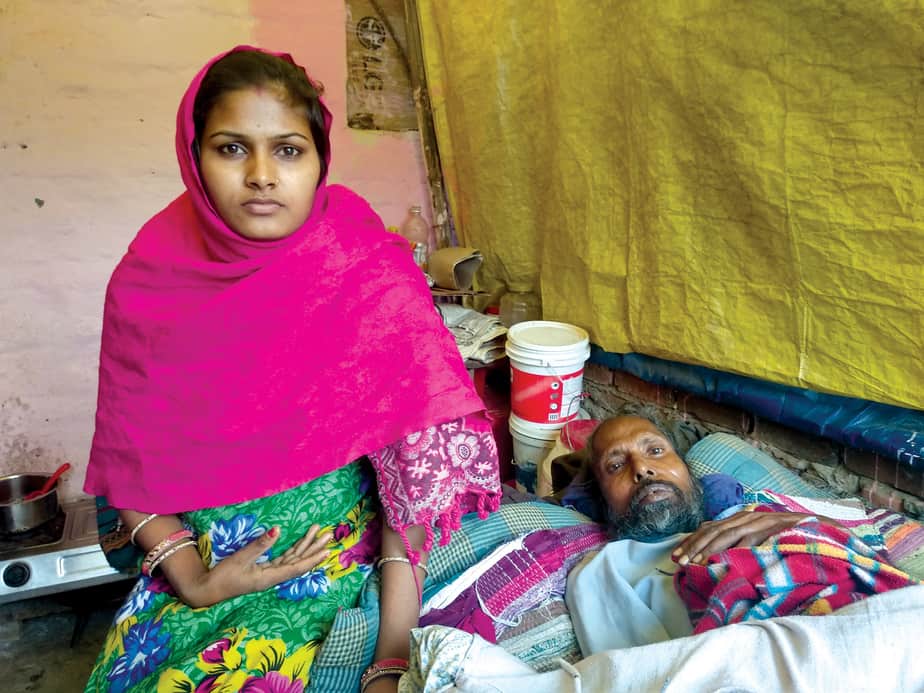As part of a series on the shadowy world of manual scavenging, Patriot visits the family of the second person who died on July 15, 2017. The first was Swarn Singh, whose family we met last week
“I still remember the sight when I saw his body lying there. His clothes were wet and dirty and smelt of the gutter. The air was foul,” says Satnam Singh, father of Inderjeet Singh.
Satnam Singh, who seems to be in his 70s, doesn’t remember his age. His legs are swollen because of an illness and he spends his entire day lying on a cot under a thick white quilt. Although he doesn’t remember his age or which day it is, he clearly remembers the nitty-gritty of what happened that day.
On July 15, Inderjeet Singh along with three other persons died at an under construction site of landowner JK Mehta in Ghitorni. They were told that they would be cleaning a rainwater harvesting tank. However, it turned out to be a septic tank, and the consequences of this deception were deadly.
Satnam Singh’s home is in the same lane where late Swarn Singh used to live: Ambedkar Colony in Chhattarpur. Their home speaks of their dire financial condition — a main door which barely blocks the entrance, a verandah where the floor is as uneven as the paint on the wall, and in the middle of the narrow verandah the cot where Satnam Singh lies.
His eyes are yellow, and his long white beard catches your gaze as you look at him. When asked about what happened that day, when Inderjeet Singh lost his life in a septic tank, Singh starts by saying, “Swarn Singh’s sister-in-law came to our home and asked, ‘Where is your son?’”
Singh was a little shocked at the time, and could not understand as to why the lady showed such urgency, he recalls. Singh’s wife, who was also present at that time in the house, replied, “He’s gone to work as usual.”
The visitor broke the news that ‘something had happened’ at Mehta’s site, where Inderjeet Singh and four other persons were working. “Because both the parents are old and dealing with severe health issues, the lady didn’t break the news in its entirety. She just said that he fell in the tank and we should go there,” says Preet Kaur, Inderjeet’s sister-in-law.
In her soft, warm voice she tries to explain what transpired after the incident. She says both the parents have become very ill since their son Inderjeet Singh died.

As she speaks, Satnam Singh adds “In the hospital they wrote his name wrong; they wrote Balwinder instead of Inderjeet, which created a lot of confusion for us when we were looking for him.”
His voice starts breaking as he tries to explain the scene at the hospital. “I went with my wife and elder son. Inderjeet’s body was locked in a room but it looked fine as compared to Swarn Singh’s, which was swollen in many parts,” adds Singh.
The family could only get custody of the body a day after the incident. Satnam Singh gaspingly starts speaking about the funeral. “Lots and lots of people were present there at the shamshan ghat. You could not even count the number of people. Not just people we knew but from different communities like Valmikis too came to pay their respects,” Singh recalls.
In the course of the conversation, Singh kept repeating one thing: “He was a good boy who lost his life for Rs 500.” He says Inderjeet was a workaholic who did not care whether it was too hot or cold outside. He was always ready to grab opportunities, always on the lookout for work.
“Before, we had even gone to that site once to eat langar,” says Singh. Little did they know that this would be the same place where his son would get killed. In a span of minutes, Inderjeet lost his life due to the gas which escaped as he scooped out the little water that was there in the tank.
His father remembers the times when he used to give all the Rs 300-400 he used to earn on the days he got work. “He used to put this one condition before giving the money to his mother — that she will have to give back Rs 20 to him so that he can buy tobacco,” adds Singh.
Inderjeet, along with his elder brother, dropped out of school in Class 6, because of little interest in studies, and spent most of his time roaming the streets of Ambedkar Colony where the family has lived for almost 40 years.
“He also cut off his hair because of some reason only he knew,” says Singh, though the family follows most of the rituals of the Sikh community.
After Inderjeet’s demise, the family has been living under strained circumstances, with their other son as the sole breadwinner in the family. They have little hope of any other assistance coming their way.
A court case in Patiala House Court, is also adding to their burden. Singh’s wife goes to court whenever a date is given. “It’s just that they keep on giving dates. There’s so much expenditure on commuting. We’ve already spent about Rs 2 lakh from the compensation which was given to us,” says Singh.
He says the other party (JK Mehta) is trying hard to settle the matter before the judgement comes. “They told my elder son that we will get Rs 40-50 lakh if we take back the case,” says Singh. This is difficult to believe. “They’re rich people. Mehta didn’t even bother to meet us after the death. He fled the area for about a month and did not return to his two farms,” says Singh.
With little idea about the logistics of the case, he barely believes in the legal system. “They just keep giving dates and my wife goes whenever they call her up,” says Singh.
Another current source of money for the family is the Rs 2,500 pension the elderly couple get bimonthly. “But that also goes into the travel to the court. My wife cannot use public transport due to her health. We have to call a cab every time,” says Singh.
The fact that the whole blame for the deaths was put on the manager of the property also saddens Singh. He says that the owner has no respect for a life lost on his property and has not let it bother him.
He also says that that was not even the work Inderjeet used to do. He used to work as a repairman of motors and pumps. “People from the Valmiki community do this work. Our son was lured into doing it,” says Singh.
He indirectly throws light on the deep roots of the social systems in which scavenging is reserved for a particularly backward caste. As that problem evades solution, deaths continue to occur. As per the official figures, 612 have occurred since 1993), whereas the Safai Karmchari Andolan says it has counted 1,790 deaths due to sheer negligence and apathy of civic authorities and private persons.





